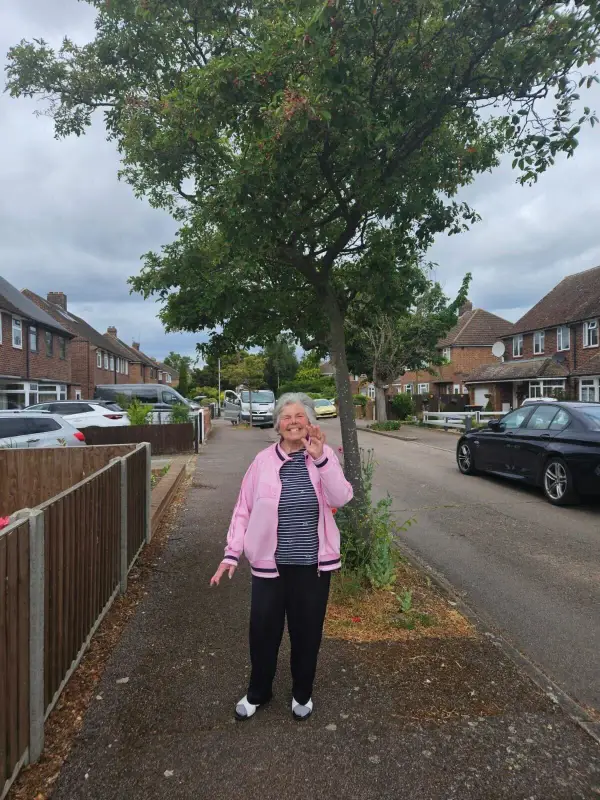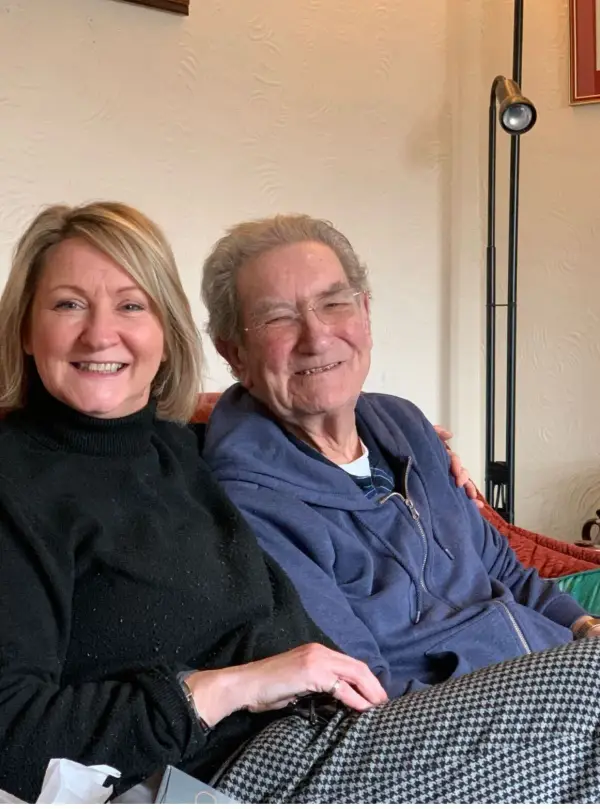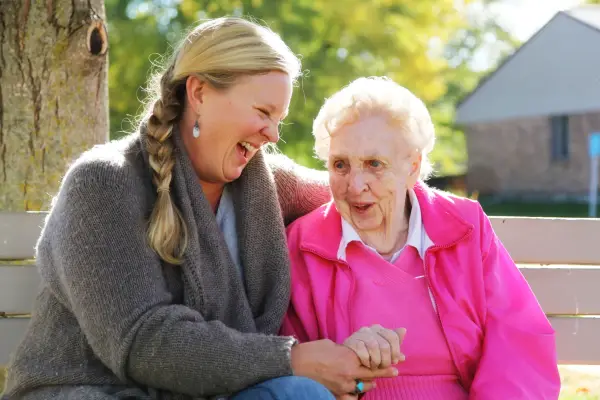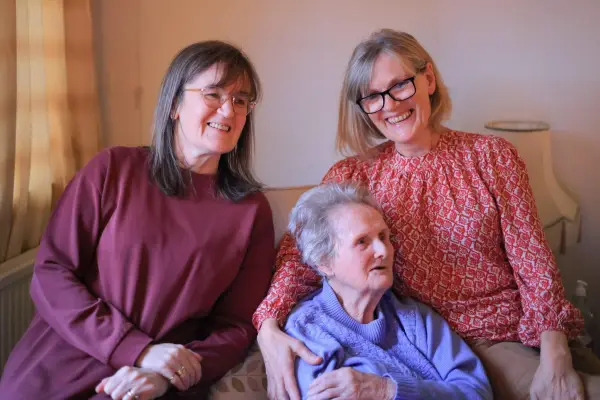Get started with short-term care
Need some short-term support at home? Elder can connect you with a self-employed carer for as little as three days at a time.
Find a carerCall us
6,000+ Carers
Select from over 6,000 qualified carers
Fast matching
Care can begin in as little as 24 hours
Across Great Britain
We have organised care in every GB postcode
Cost efficient
Costs on average 35% less than traditional services

What is short-term care?
Short-term care is temporary support provided at home for a few days or several weeks. It’s designed to help older people continue living safely and comfortably in familiar surroundings when they need extra assistance for a limited period of time.
A carer moves into the home and provides personalised support with daily tasks, personal care, companionship, and specialist needs, while maintaining existing routines.

Who is short-term live-in care suitable for?
Short-term live-in care may be suitable if your loved one needs temporary support at home for a limited period of time. It can help when:
- Someone is returning home after a hospital stay
- A regular carer is unavailable
- Extra support is needed during recovery
- You want to trial live-in care before arranging long-term support
- Family members need short-term additional help.
Because care takes place at home, your loved one can maintain their routine and remain in familiar surroundings.
What does a short-term carer do?
A short-term live-in carer provides personalised support at home for a limited period of time. They help older people stay safe, comfortable, and independent in familiar surroundings – whether they’re recovering after a hospital stay, adjusting to changing needs, or requiring temporary additional support.
Some of the daily tasks a short-term carer can carry out include:
- Personal care
e.g. help with washing, toileting, and prompting medication
- Dressing and grooming
e.g. shaving and hairstyling
- Meal preparation
e.g. cooking meals to dietary requirements and tastes
- Light housekeeping
e.g. vacuuming, keeping surfaces clean and doing laundry
- Running errands
e.g. going to the shops or picking up prescriptions
- Companionship
e.g. providing company and encouraging hobbies and interests
- Pet care
e.g. feeding and exercising pets
- Mobility support
e.g. encouraging gentle and suitable exercise
- Light gardening
e.g. watering flowers and keeping pathways clear
- Admin support
e.g. keeping on top of post, paperwork, and appointments
- Medication prompting
e.g. ensuring medication is taken correctly
- Stoma care
- PEG care
- Wound care
- Ventilation and oxygen support
e.g. BiPAP or CPAP Support
- Specialist drug administration
including Controlled Drug Administration, Covert Medication Administration,
Glucose readings via finger pricks, Injections, Pessaries, Enemas, Suppositories
How much is short-term live-in care?
On average, families pay £684+ for 3 days, and £1,595+ per week for short-term care on Elder’s platform.
Your arrangement will be between yourself and your self-employed carer, who will use the information you share in your MyElder account to understand the care you require.
How do I arrange short-term care with Elder?
Share your care request
Tell us your care requirements using our request form, including the type of care you’re looking for, any specialist skills you need, and what daily life looks like.
Select your carer
You’ll start receiving profiles of suitable self-employed carers within 24 hours. Chat to them online or arrange a phone or video call, before choosing who you like best.
Manage care
Once your agreement with your carer begins, use your MyElder account to chat with them and the Elder team, manage your schedule and care information, and find respite cover if you need it.
Customer stories: Finding trusted live-in care
Finding the right care can feel overwhelming, but hearing how others made the decision can help. Explore real stories of families who found trusted support through live-in care.

Live-in care vs care home: Kenn and Nicole’s story
Kenn and Nicole share how live-in care allowed their parents to stay safe and happy in their own home, avoiding the stress of a care home.
Read Kenn and Nicole's story
How home care gave Sharon peace of mind
Sharon shares how home care supported her mum Sheila and gave her peace of mind knowing her mum was cared for and never alone.
Read Sharon's story
How live-in care allowed Hayley's dad to remain at home
Hayley shares how live-in care gave her dad tailored support, enabling him to regain his independence after being discharged from hospital.
Read Hayley's story
FAQs about short-term live-in care
Still have questions?
0333 920 3648Thanks to our nationwide network of self-employed carers, we’re often able to arrange short-term live-in care within 24 hours. In urgent cases, we’ve even matched families with a suitable carer on the same day.
Short-term care can be arranged for as little as three days or for several weeks. With Elder, you can book a period of short-term care with a rough end date, simply give us a call and let us know if you need to extend or amend your dates.
Yes. Short-term live-in care takes place in the person’s own home. The carer moves into the home for the agreed period, helping your loved one remain in familiar surroundings while receiving one-to-one support.
Short-term care is a broad term for temporary support provided for a limited period of time, such as during recovery after surgery, illness, or when additional help is needed at home.
Respite care is a specific type of short-term care arranged to give a primary caregiver a break from their usual responsibilities.
Yes. If you’re happy with your carer, you can rebook them for future short-term care periods through your MyElder account, subject to availability.
Yes. If your circumstances change, you can extend your care arrangement, provided your chosen carer is available. Flexibility is built into the booking process.
Yes. Many families arrange short-term live-in care when a loved one is returning home from hospital and needs temporary additional support during recovery.
Explore other care options
At Elder, we provide a full range of home care services to suit every need. If your loved one requires around-the-clock support or occasional help for a couple of hours, these options may be more suitable:

Live-in care
Long-term 24-hour support
- A carer moves in with your loved one to support them 24/7
- Suitable for people living with conditions like dementia and reduced mobility
- For long-term care needs

Visiting care
Flexible home visits
- Book as many hours as you need for help in the comfort of your home
- Support with everyday tasks like grooming, walks, cooking, etc.
- From as little as 1 hour per week